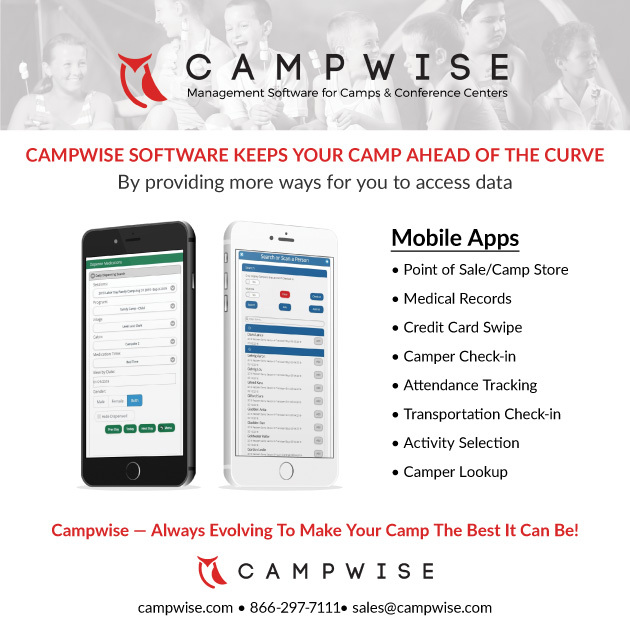I am going to take a stab in the dark and guess that you are not planning on becoming a professional camp counselor. True, some of you will fall in love with camp this summer and may end up changing your major so that camp becomes your career path. And for those of you who grew up going to camp, perhaps you are already on this professional summer camp path. After all, the owner of Camp Robindel, where I work, knew as a 12-year-old camper he wanted to be a camp director, so certainly that is possible. On the other hand, I know most of you are not planning on a career in summer camp at this point. So, why did you choose to be a camp counselor this summer?
Most of us make this decision for one of the following reasons:
- You consider this to be the last summer to have fun before having to get a "real job." (We can talk about this later, or, better yet, you can take a look at Project Real Job.)
- You love working with kids and may be planning to be a teacher, go into youth development, etc.
- Someone told you about the opportunity and you didn't have anything else lined up.
- You love the movie The Parent Trap. (I can't be the only one who loved that movie and came to the obvious conclusion that working at summer camp would be a good idea.)
Regardless of your reason for deciding to be a camp counselor, you are among the lucky few for whom the stars have aligned perfectly for this to be a life-changing summer. You may have already been told that you will make lifelong friends, that you won't understand how camp will change your life until the end of the summer, or that you will change the campers' lives forever. In my camp experience, these statements have proven to be completely true. But I want to encourage you to go even further with your camp experience. Since you are not going into the summer with the intention of being the worst staff member, so why not try being the best? Not in a competitive way of being better than everyone else, but by being the best possible version of yourself. Take advantage of this time to focus on growing as an individual. Take hold of this experience and use it to be the person you want to be. That may sound cheesy, but if you are anything like the counselors I work with, you have big dreams of making a positive impact in the world. Cheesy or not, to make a difference, it is incredibly helpful to be aware of what you are good at and what you need to work on. Whether or not you did it intentionally, you now have a job that can help you identify and practice your skills while also working on certain challenges.
The skills I am referring to are soft skills and emotional intelligence (EQ). Do you feel like your teachers, parents, and the media are all harping on these? Well, as annoying as that probably is, in this case, they're right. There is a saying out there that goes, "IQ gets you hired, EQ gets you promoted." Soft skills and EQ help you positively impact and influence the community you choose to engage with; these skills help you get things done in a way that makes others want to join you and be on your team. Whether that is a specific career choice, a social or political issue you support, or even the interactions you have with your family and friends, such skills are essential in life.
There are a million reasons to work on your soft/EQ skills, but I want to focus on one. Camp is the place you can practice the skills that employers look for when hiring. According to LinkedIn's 2020 survey of the most in-demand soft skills, creativity, persuasion, collaboration, adaptability, and emotional intelligence (which includes empathy, self-awareness, motivation, social skills, and emotional regulation) rank at the top (Van Nuys, 2019). Lucky for campers everywhere (and for your own growth), these are the very skills you can strengthen this summer as a counselor. Camp is a leadership internship — and as with every internship and experience, what you put in determines what you will get out.
Training Ground
Camp is one of the few places where the people with the least amount of experience have the greatest amount of work and direct influence. Camp is an intense experience of building and growing a community. You are going to be leading young people who are looking for someone who cares, listens, includes them, and understands them. In other words, thousands of campers are waiting to meet a role model like you who will help them become the best version of themselves. There is no better way to be that role model than to commit to waking up each day this summer to practice being the best version of yourself.
If you are looking for some ideas on how to begin or continue your own growth, here's what I've learned in working with other emerging leaders like you.
Somewhere to Start
Knowing yourself is important if you're going to lead others, and the following steps can help make sure you truly recognize the person staring back at you in the mirror.
1. Engage in Self-Reflection
Take an honest look at yourself and evaluate where your skills are now. This is a practice of being self-aware (an EQ skill). Answer these questions:
- How do you cope when you are overwhelmed? Annoyed? Upset? Hungry? Tired?
- Can people trust you? Do you ever tell other people about something you've heard? In other words, do you gossip?
- When someone disagrees with you what is your go-to mode of communication?
- Think about a time you were part of a group that didn't accomplish their goals. What emotions did you have when things didn't go as planned? What was your reaction to feedback? Did it depend on who provided the information?
A note about being honest with yourself: I find that it can be challenging to accurately pinpoint where we are in our soft skill/EQ growth. After all, who wants to admit that empathy can be challenging? That makes us sound mean or awful. Who wants to say they struggle to adapt when things don't go as originally planned? But if we aren't honest and don't intentionally work on our challenges, they come out anyway. They come out in conflict or drama, which leads to dysfunctional teamwork and doesn't provide great role-modeling for your campers.
2.Set Goals
From your self-reflection, set three to five goals for the summer. Use a system that works for you, but consider the following suggestions:
- Write them down. They can be bullet points, doodle drawings, a full novella — whatever format works for you.
- Share your goals with someone else. If you are like me, the only way I make it to the gym regularly is if I am meeting a friend. For many of us, the same principle holds true for goals. When someone is helping to hold us accountable, we tend to be better about doing it.
- Set goals that motivate you. If your goal is to have a fun summer job, great! I promise if you set a few goals to be your best self by practicing a few soft skills, it will make for a fun summer.
3. Find a Mentor
If possible, find a mentor both within camp and outside of camp. Ask specifically for what you want from the relationship — situational advice, someone to listen, someone who will hold you accountable, someone who can meet regularly, etc. If you've never had a mentor, or the process of finding the right one just feels awkward, google the Forbes article "40 Questions to Ask a Mentor" (Miller, 2018).
4. Practice
Commit to striving for excellence. Remind yourself each morning what your goals are. Have the courage to look yourself in the eye each night and ask, "Where did I nail it, and where did I fall flat?" Then get up the next morning and practice again. A quote that motivates me to keep trying comes from artist Mary Anne Radmacher, who said, "Courage does not always roar. Sometimes courage is the quiet voice at the end of the day saying, ‘I will try again tomorrow.'" And there is nothing more courageous than being purposeful in living as your best self.
Ways You Can Practice
You will find countless ways to practice and improve on your soft skills at camp this summer.
Persuasion
There are going to be times when your campers (or even your coworkers) aren't going to want to do something. At our camp, those times tend to be waking up, going to bed, and cleanup. Troubles may also arise if it is too cold, too rainy, too hot — you get the point. Regardless of how fun camp is, there will be a time when someone doesn't want to do what is planned or expected.
Some days will be magic, and you'll be able to persuade a hesitant kid to hop in the water with a little pep talk. Other days you will fail, and it will seem like nothing you do helps the situation. Instead of insisting you have to be the one to solve the problem, move on to collaboration. Let a co-counselor take the handoff; it's great practice.
Collaboration
Collaborating with people who agree with you and have similar energy and ideas is easy. The challenge and growth opportunity is in learning how to collaborate with those whom you may not find it so easy to work with. The wide variety of people you will meet at camp is an excellent way to build your collaboration skills.
The way you go about motivating campers or engaging in your work as a counselor may vary vastly compared to other camp staff. How do you collaborate to achieve common goals? Can you keep your frustration or annoyance from controlling you, or will you allow your emotions to take over in communicating and making decisions?
Adaptability
When it rains, it pours. Weather can seriously impact regular outdoor activities. This can be challenging for you and the campers. Pull up your EQ skills boots and be ready to adapt.
Originally you were going to have five campers at your activity, and now there are 15. Instead of flipping out, recognize the opportunity to build your adaptability muscle.
Creativity
This skill reigns supreme at camp. Not just in creating a fun evening activity or special event for your campers. Or making creative welcome signs or decorating the recreation hall for a crazy camp celebration. But camp is a terrific place to use creativity in problem-solving. I love the practice of 5 Whys (see mindtools.com/pages/article/newTMC_5W.htm) in thinking creatively about challenges we face. Also look at creative suggestions for handling camper behaviors from camp experts. They provide excellent foundation that will enhance your ability to be a creative problem solver.
This summer let camp be the place to strengthen these skills I've been yammering on about. Use empathy to determine how best to motivate someone who doesn't want to do something (by the way, that someone might be you). Be self-aware of how you react to adverse situations such as collaborating with a co-counselor who comes across as a know-it-all or slacker. Practice your social skills by not gossiping and vent up rather than out (in other words, vent to a supervisor to solve the issue). You can spend a lot of energy getting frustrated and complaining about the challenges that are bound to come up this summer. Or you can remind yourself that only we lucky few land this incredible skill/EQ internship and can work on becoming a stronger, better equipped version of ourselves.
Have fun. Be intentional. Grow strong. And don't forget to share any cool growth opportunity you have this summer @acacamps #bestself2020.
Additional Resources
- Project Real Job: ACAcamps.org/resource-library/jobs-recruitment/project-real-job
- Self-reflection: inc.com/justin-bariso/ask-yourself-these-5-questions-daily-your-emotional-intelligence-will-skyrocket.html
- Creative problem-solving: innovationmanagement.se/imtool-articles/the-basics-of-creative-problem-solving-cps/
- Emotional intelligence:
- hbr.org/2004/01/what-makes-a-leader
- online.hbs.edu/blog/post/emotional-intelligence-in-leadership
- Goal setting: varsitytutors.com/blog/3+methods+for+setting+goals
- Venting: thoughtfulleader.com/vent-frustration
- Experts in camping:
- ACAcamps.org/resource-library/camping-magazine/trenches-camper-behavior-%E2%80%94-growth-without-shame
- ACAcamps.org/resource-library/camping-magazine/confessions-disciplinarian-how-managing-camper-behavior-can-save-summer
References
- Miller, J. (2018, March 25). 40 questions to ask a mentor. Forbes. Retrieved from forbes.com/sites/jomiller/2018/03/25/40-questions-to-ask-a-mentor/#3743b7dd261b
- Mind Tools. (n.d.). 5 whys: Getting to the root of a problem quickly. Retrieved from mindtools.com/pages/article/newTMC_5W.htm
- Radmacher, M. A. (n.d.). Quotes from Mary Anne Radmacher. Goodreads. Retrieved from goodreads.com/quotes/4699-courage-does-not-always-roar-sometimes-courage-is-the-quiet
- Van Nuys, A. (2019, December 28). New LinkedIn research: Upskill your employees with the skills companies need most in 2020. LinkedIn. Retrieved from learning.linkedin.com/blog/learning-thought-leadership/most-in-demand-skills-2020
Jolly Corley, MS, is a leadership coach who is passionate about experiential learning as a tool for growth and development. She cultivates leadership skills using practical strategies for self-evaluation and goal setting. Jolly encourages participants to consider challenges an opportunity for growing into their best selves. During the summer she works with 130 university students at Camp Robindel in New Hampshire, where she has spent 20 years developing emerging leaders. In the fall and winter she spends time traveling around the globe training and speaking about EQ and leadership development. Learn more about Jolly at jollycorley.com or connect at [email protected].




